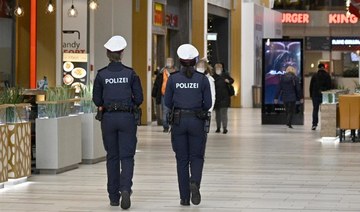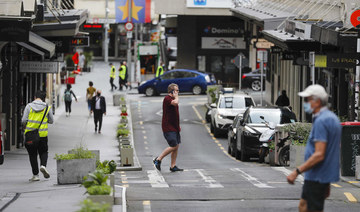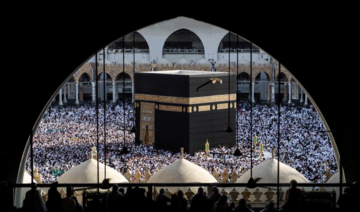RIYADH: Saudi Arabia on Friday recorded 35 new COVID-19 cases, taking the total for the country to 549,412, the Ministry of Health said.
Another 42 people were reported as having recovered from COVID-19, putting the number of recoveries since the start of the pandemic at 538,505.
However, one COVID-19-related death was logged in the past 24 hours, meaning 8,822 people in the Kingdom have now died after contracting the virus.
More than 47 million doses of vaccine have now been administered in the country.
The ministry, which has 587 centers throughout the Kingdom dealing with inoculations, has urged citizens who have not yet received a vaccine to get one.
It also renewed calls for people to adhere to precautionary measures and register with the Sehhaty app to receive vaccines.
Saudi Arabia announces one more COVID-19 death
https://arab.news/57556
Saudi Arabia announces one more COVID-19 death

- The total number of recoveries in the Kingdom has increased to 538,505
- A total of 8,822 people have succumbed to the virus in the Kingdom so far
Saudi Arabi’s markets ready for annual surge in demand

- Souvenirs and gifts for loved ones are a cherished homecoming tradition for pilgrims
JEDDAH: Every year, markets in Saudi Arabia witness increased footfall as Hajj pilgrims look for souvenirs and gifts to commemorate the journey of a lifetime.
The gold market, especially in Makkah, Madinah and Jeddah, thrives with its showcase of intricate designs, from traditional to contemporary styles, catering to diverse jewelry tastes.
Speaking to Arab News, Mohammed Akbar, a trader in Jeddah said: “During the Hajj season, we make it a point to showcase designs that cater to all nationalities. Pilgrims from diverse countries have a penchant for various types of gold.

“Buying gold is viewed as an investment, particularly by many Asian and African pilgrims, as they often find gold jewelry to be more affordable and of superior quality compared to what is available in their home countries. We expect an increase in gold sales this year.”
The rising price of gold has emerged as a significant trend, indicating the increasing demand and investment appeal of this valuable metal among pilgrims. As per traders, the rates for 21-carat gold are expected to range between SR250 ($66.6) to SR254 per gram, and SR267 per gram for 22-carat gold during the Hajj season.
HIGHLIGHTS
• Handcrafted goods, such as calligraphy art, prayer beads, and intricately designed prayer rugs, serve as tangible reminders of the sacred journey undertaken by pilgrims.
• Buying gold is viewed as an investment by some pilgrims, as they find Kingdom’s gold jewelry to be more affordable and of superior quality, says Jeddah trader.
Beyond gold purchases, the market for Hajj souvenirs includes an array of items with Islamic motifs. Handcrafted goods, such as calligraphy art, prayer beads, and intricately designed prayer rugs, serve as tangible reminders of the sacred journey undertaken by pilgrims. These souvenirs not only hold sentimental value but also serve as meaningful gifts to loved ones back home.

Mohammed Dossary, an Egyptian pilgrim attending Hajj with his family, said: “This is my second Hajj pilgrimage, but the first with my family. During my previous visit, I only brought simple gifts such as sweets, prayer mats, nuts and toys for the children. However, this time I have noticed a significant change — every shop now offers unique items with a wider range of options.
“Near my hotel, there is a perfume store that personalizes perfumes in 50ml bottles by engraving names on them. We purchased two dozen of these customized perfumes for our family members.”
Waleed Jabir from Oman expressed his surprise at the changes in the markets and price increases. “I am taken aback by the increase in prices across the board. Miswak, previously priced at two riyals, now cost SR15 due to their organic nature and the introduction of modern packaging with a reusable safe case,” he said.
Jabir added that the variety of toys available has also expanded, noting that he purchased Islamic quiz flash cards, board games, and a toy laptop that contains the entire Qur’an recorded on it.
Saleh Mohammed, who owns a shop near Al-Masjid an-Nabawi, said: “Every pilgrim desires distinctive souvenirs such as silverware, precious stones, intricately crafted jewelry, handwoven textiles, or dates. Selling just a single piece of silverware brings in a substantial amount.
“Additionally, engraving names on prayer mats is a service frequently requested by pilgrims. In a society where material goods can lose their significance, these souvenirs are often cherished as lasting memories.”
Nusuk card and wallet bring peace of mind to Hajj pilgrims

- Zahra Aleid, a Saudi pilgrim, told Arab News: “It (Nusuk card) is a very important aspect of Hajj, especially with the crowds. It is very common for people to lose their family or the people they came with
RIYADH: Two initiatives by Nusuk — the pilgrim card and wallet — are helping to improve the Hajj and Umrah experience for pilgrims.
Nusuk, the official booking platform authorized by the Ministry of Hajj and Umrah for e-visa and planning, allows travelers to create pilgrimage itineraries for Makkah, Madinah and beyond.
Through the pilgrim card — an identity card worn around the neck — Hajj workers are able to verify the identity of each pilgrim, preventing unauthorized people from entering the holy sites.

Zahra Aleid, a Saudi pilgrim, told Arab News: “It (Nusuk card) is a very important aspect of Hajj, especially with the crowds. It is very common for people to lose their family or the people they came with. So, with this card people or security guards can help find your family using the information on the card.”
Aleid's experience of Hajj was a success, she arrived with a group of pilgrims from the Municipality of Qatif with Masar Batool, a travel service company.
“I am very grateful to be here. I wanted to come to Makkah for a very long time, I love this place ... I wanted to come to Umrah, but I am here now. Thank God I am in Hajj,” she said.
FASTFACT
Through the Nusuk pilgrim card — an identity card worn around the neck — Hajj workers are able to verify the identity of each pilgrim, preventing unauthorized people from entering the holy sites.
A video that recently went viral on social media showed the effectiveness of the Nusuk card when a group of Saudi men were able to help a lost Nigerian pilgrim who was found wandering the streets of Makkah. After scanning his Nusuk card, the locals were able to identify the hotel he was staying at and drove him there in safety.
Minister of Hajj and Umrah, Tawfiq Al-Rabiah, reposted the video on his official X account to highlight Saudi “hospitality, generosity, solidarity, and cooperation.” The minister continued: “Thank you to these young people for their help … here the value of Nusuk appears, which contains detailed data for each pilgrim.”
The ministry also, in cooperation with the Saudi National Bank, launched an international digital wallet for Umrah and Hajj pilgrims.
The Nusuk wallet allows pilgrims to manage their money, while using encryption technology for security.
In a previous report by the Saudi Press Agency, Ahmed bin Sulaiman Al-Maiman, the director of digital experience at the ministry, said: “It is the first digital wallet and international bank card in the world, allowing Hajj pilgrims and Umrah performers to manage their money during the period of their stay for performing rituals. Following this move, we have become closer to achieving our goal of developing a successful super-app that meets pilgrim’s needs.”
He said that the wallet addresses the needs of users and is integrated with the latest technologies such as artificial intelligence, encryption and biometric identity verification, in addition to advanced technologies such as API (application programming interface) and integrated SDK (software development kit).
“It is also the first open loop digital wallet embedded within an application in the world, designed to enable Hajj pilgrims and Umrah performers to manage their money,” he added.
Saleh Al-Furaih, CEO of SNB’s digital ventures and payments, said the service complies with Saudi Central Bank regulations, which guarantees financial security.
Saudi FM discusses Gaza, Yemen and Sudan with Blinken

RIYADH: Saudi Foreign Minister Prince Faisal bin Farhan received a phone call from US Secretary of State Antony Blinken on Monday, Saudi Press Agency reported.
During the call, the two officials discussed developments in the Gaza Strip, Yemen, and Sudan.
Saudi interior ministry arrests six violators of Hajj regulations

- Those arrested were given 15-day prison sentence and fined SR10,000 for each violator they tried to transport
- The vehicles used to transport the violators were confiscated
RIYADH: Hajj security forces stationed at entrances to Makkah arrested on Sunday six people who violated Hajj regulations by transporting a group of 52 individuals attempting to perform Hajj without a permit.
The resident and five citizens were each given a 15-day prison sentence and fined SR10,000 ($2,665) for each violator they tried to transport illegally.
The vehicles used to transport the violators were also confiscated, the Ministry of Interior said.
Residents who violate Hajj regulations face deportation and the ministry has urged all citizens and residents to strictly comply with Hajj regulations to ensure pilgrims feel safe, comfortable, and at peace when performing Hajj rituals.
44.8m phone calls by pilgrims during Eid

- 38.04 million were local and 6.76 million were international calls, with a success rate of more than 99 percent
- In terms of data usage, pilgrims consumed 5,790 terabytes during the holiday
MINA: Pilgrims in Makkah and at the holy sites made a record-breaking 44.8 million telephone calls on Sunday during Eid Al-Adha, Saudi Arabia’s Communications, Space and Technology Commission said on Monday.
Of those, 38.04 million were local and 6.76 million were international calls, with a success rate of more than 99 percent.
In terms of data usage, pilgrims consumed 5,790 terabytes during the holiday, the commission added, which is equivalent to streaming more than 2.37 million hours of high-definition, 1080p video.
Average daily data consumption reached 779.93 megabytes per subscriber, which was more than double the global average of 380MB.
The mobile internet infrastructure was able to provide an average data-download speed of 376.18 megabits per second and an average upload speed of 48.04Mbps, according to the commission.





















